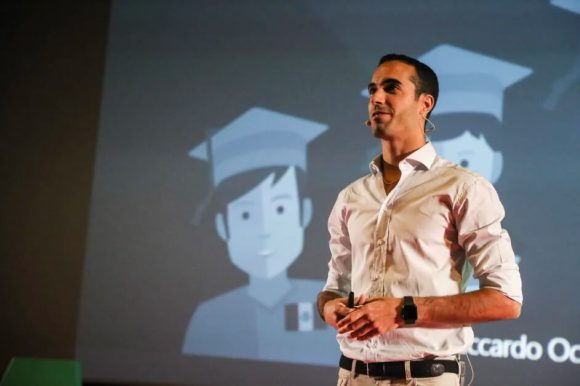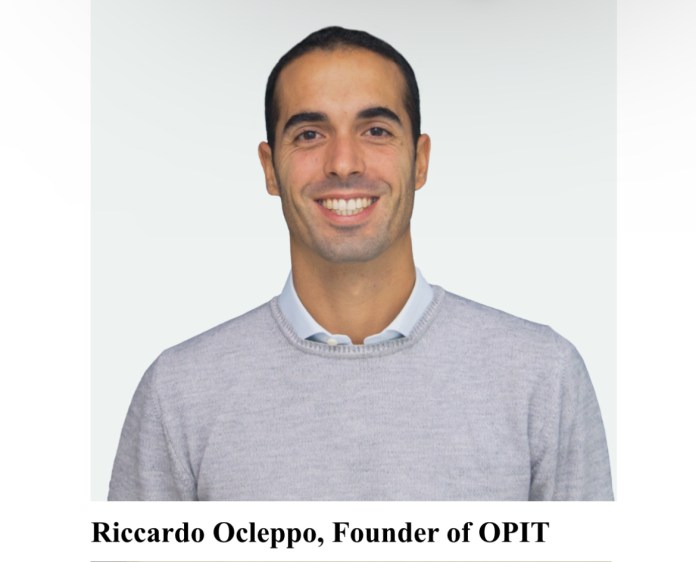

Written on April 11th 2024
Source here: B&FT Online
Open Institute of Technology (OPIT), an EU-accredited online institution renowned for its expertise in Information Technology (IT) education, has unveiled plans to increase enrollment from African countries, including Nigeria, Kenya, and Ghana, for the academic year 2024.
Since its inception in 2023, OPIT has been dedicated to providing world-class education in information technology, and now, it is expanding its global reach to welcome students from diverse backgrounds across Africa.

In its inaugural year, OPIT attracted a diverse cohort of 100 students from 38 different nations, with a notable representation from Africa. A proportion of both Bachelor’s (9percent) and Master’s (7percent) students originated from African countries, demonstrating OPIT’s commitment to fostering diversity and inclusivity within its student body.
Also, a substantial percentage (40percent) of Master’s students hailed from non-STEM backgrounds, underscoring OPIT’s dedication to providing educational opportunities to individuals from diverse professional domains. OPIT’s first cohort boasted students from a wide array of industries, including consulting, tech, gaming, energy, government, financial services, agriculture, oil and gas, and education, among others. This diverse mix of backgrounds contributes to a rich and vibrant learning environment at OPIT.
In anticipation of its upcoming student intake, OPIT has implemented several enhancements to its programmes, faculty, and support services:
New and enhanced programmes
OPIT has introduced four specialized tracks for its BSc in Computer Science programme for 2024, including Cybersecurity, Data Science & AI, Software Development & Cloud Computing, and Metaverse & Gaming. Additionally, a new BSc in Digital Business has been launched, catering to students interested in blending digital business with core computer science principles.
In addition to the existing MSc Applied Data Science and Artificial Intelligence (AI) programme, OPIT now offers other Masters Degree options:
 MSc Enterprise Cybersecurity
MSc Enterprise Cybersecurity MSc Applied Digital Business
MSc Applied Digital Business MSc Responsible Artificial Intelligence (AI)
MSc Responsible Artificial Intelligence (AI)Concerning its revamped Bachelors and Masters programmes, Professor Francesco Profumo, Rector of OPIT (and former Minister of Education, University and Research of Italy) said:“In an era marked by an inevitable acceleration towards the most urgent transitions impacting society in the digital age, OPIT’s mission is to focus on quality online education in Technology.
The starting point is the awareness of the misalignment in the labor market, between what is taught in most universities and what companies are looking for today. That so-called mismatch, accelerated by the advent of AI, is generated by too much theory and too little practical approach. We have identified the skills that will guide this change and translated them into our innovative Degrees.”

Faculty expansion
The faculty at OPIT stands out as one of its greatest assets. In 2024, OPIT’s faculty members boast a diverse blend of academic and professional experiences, with stints at renowned institutions and organizations including Symantec, Microsoft, PayPal, McKinsey, MIT, Morgan Stanley, University of Edinburgh, Amazon, US Naval Research, and more. This deliberate mix ensures a well-rounded approach to training at OPIT, incorporating both scholarly expertise and real-world insights.
Speaking concerning OPIT’s faculty and teaching, Riccardo Ocleppo, Founder and Director of OPIT stated: “Our teaching model combines quality, flexibility, and cost-effectiveness. We believe that education, even if it takes place remotely, must guarantee closeness on all other aspects, starting from the support for the student throughout the period of study. We have translated into practice a new idea of higher education, radically different from the offering from traditional universities.”
“To support our approach, we have selected some of the most experienced academics and professionals in the Technology sphere. The quality of the Professors and the innovative format guarantees a tier-1 learning experience within a community of people linked by the common goal of entering the job market with up-to-date, relevant skills.”
Experiences & opportunities
OPIT offers a diverse array of global perspectives, as students and faculty come from various corners of the world. A freshly established Career Services Department aims to forge stronger connections between students and their desired industries and career paths.
Moreover, students from Africa enrolling in 2024 will enjoy the advantage of having their degrees recognized by the World Education Services (WES). This recognition translates to the potential conversion of OPIT degrees into points for immigration assessment processes in the United States and Canada in the foreseeable future.
Related posts

Source:
- Times of Malta, published on September 18th, 2025
4 min read
The gathering brought together academics and technology leaders from prominent European Institutions, such as Instituto de Empresa (IE University), OPIT itself and the Royal College of Arts, to explore how artificial intelligence is reshaping the university experience.
The OPIT AI Copilot has been trained on the institute’s complete academic archive, a collection created over the past three years that includes 131 courses, more than 3,500 hours of recorded lectures, 7,500 study resources, 320 certified assessments, and thousands of exercises and original learning documents.
Unlike generic AI tools, the Copilot is deeply integrated with OPIT’s learning management system, allowing it to track each student’s progress and provide tailored support.
This integration means the assistant can reference relevant sources within the learning environment, adapt to the student’s stage of study, and ensure that unreleased course content remains inaccessible.
A mobile app is also scheduled for release this autumn, that will allow students to download exercise and access other tools.
During examinations, the Copilot automatically switches to what the institute calls an “anti-cheating mode”, restricting itself to general research support rather than providing direct answers.
For OPIT’s international community of 500 students from nearly 100 countries, many of whom balance studies with full-time work, the ability to access personalised assistance at any time of day is a key advantage.
“Eighty-five per cent of students are already using large language models in some way to study,” said OPIT founder and director Riccardo Ocleppo. “We wanted to go further by creating a solution tailored to our own community, reflecting the real experiences of remote learners and working professionals.”
Tool aims to cut correction time by 30%
The Copilot will also reduce administrative burdens for faculty. It can help grade assignments, generate new educational materials, and create rubrics that allow teachers to cut correction time by as much as 30 per cent.
According to OPIT, this will free up staff to dedicate more time to teaching and direct student engagement.
At the Milan event, Rector Francesco Profumo underlined the broader implications of AI in higher education. “We are in the midst of a deep transformation, where AI is no longer just a tool: it is an environment that radically changes how we learn, teach, and create,” he said.
“But it is not a shortcut. It is a cultural, ethical, and pedagogical challenge, and to meet it we must have the courage to rethink traditional models and build bridges between human and artificial intelligence.”
OPIT was joined on stage by representatives from other leading institutions, including Danielle Barrios O’Neill of the Royal College of Art, who spoke about the role of AI in art and creativity, and Francisco Machin of IE University, who discussed applications in business and management education.
OPIT student Asya Mantovani, also employed at a leading technology and consulting firm in Italy, gave a first-hand account of balancing professional life with online study.
The assistant has been in development for the past eight months, involving a team of OPIT professors, researchers, and engineers.
Ocleppo stressed that OPIT intends to make its AI innovations available beyond its own institution. “We want to put technology at the service of higher education,” he said.
“Our goal is to develop solutions not only for our own students, but also to share with global institutions eager to innovate the learning experience in a future that is approaching very quickly.”

From personalization to productivity: AI at the heart of the educational experience.
Click this link to read and download the e-book.
At its core, teaching is a simple endeavour. The experienced and learned pass on their knowledge and wisdom to new generations. Nothing has changed in that regard. What has changed is how new technologies emerge to facilitate that passing on of knowledge. The printing press, computers, the internet – all have transformed how educators teach and how students learn.
Artificial intelligence (AI) is the next game-changer in the educational space.
Specifically, AI agents have emerged as tools that utilize all of AI’s core strengths, such as data gathering and analysis, pattern identification, and information condensing. Those strengths have been refined, first into simple chatbots capable of providing answers, and now into agents capable of adapting how they learn and adjusting to the environment in which they’re placed. This adaptability, in particular, makes AI agents vital in the educational realm.
The reasons why are simple. AI agents can collect, analyse, and condense massive amounts of educational material across multiple subject areas. More importantly, they can deliver that information to students while observing how the students engage with the material presented. Those observations open the door for tweaks. An AI agent learns alongside their student. Only, the agent’s learning focuses on how it can adapt its delivery to account for a student’s strengths, weaknesses, interests, and existing knowledge.
Think of an AI agent like having a tutor – one who eschews set lesson plans in favour of an adaptive approach designed and tweaked constantly for each specific student.
In this eBook, the Open Institute of Technology (OPIT) will take you on a journey through the world of AI agents as they pertain to education. You will learn what these agents are, how they work, and what they’re capable of achieving in the educational sector. We also explore best practices and key approaches, focusing on how educators can use AI agents to the benefit of their students. Finally, we will discuss other AI tools that both complement and enhance an AI agent’s capabilities, ensuring you deliver the best possible educational experience to your students.
Have questions?
Visit our FAQ page or get in touch with us!
Write us at +39 335 576 0263
Get in touch at hello@opit.com
Talk to one of our Study Advisors
We are international
We can speak in:
